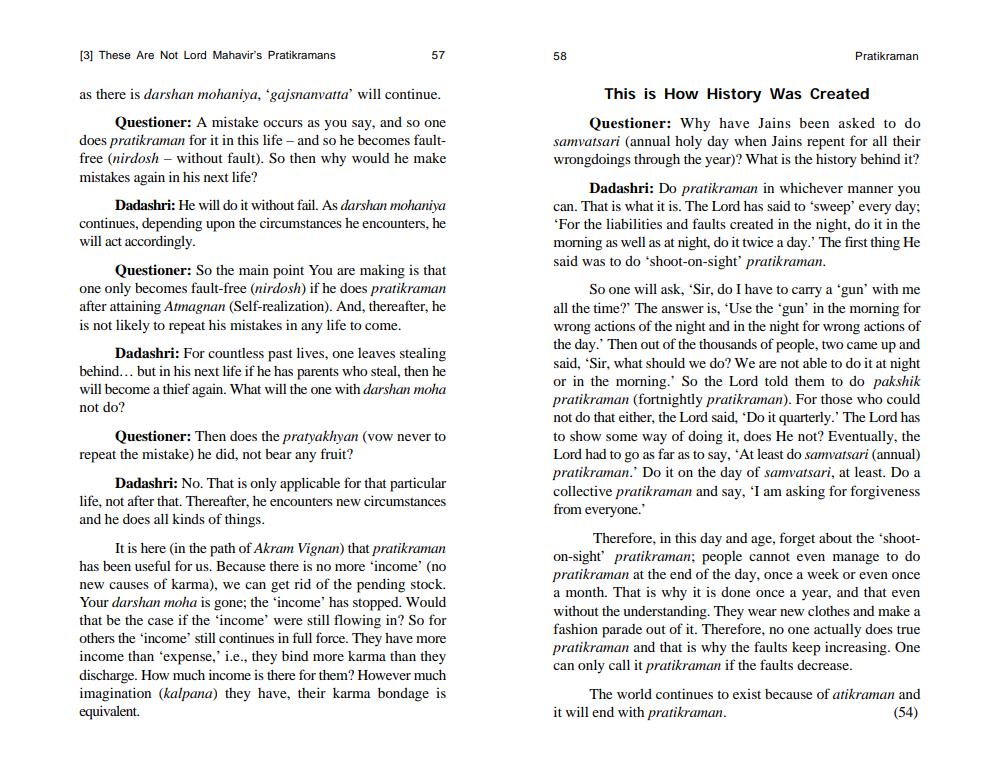________________
[3] These Are Not Lord Mahavir's Pratikramans
57
Pratikraman
as there is darshan mohaniya, gajsnanvatta' will continue.
This is How History Was Created
Questioner: A mistake occurs as you say, and so one does pratikraman for it in this life and so he becomes faultfree (nirdosh - without fault). So then why would he make mistakes again in his next life?
Dadashri: He will do it without fail. As darshan mohaniya continues, depending upon the circumstances he encounters, he will act accordingly.
Questioner: Why have Jains been asked to do samvatsari (annual holy day when Jains repent for all their wrongdoings through the year)? What is the history behind it?
Dadashri: Do pratikraman in whichever manner you can. That is what it is. The Lord has said to 'sweep' every day; *For the liabilities and faults created in the night, do it in the moming as well as at night, do it twice a day.' The first thing He said was to do 'shoot-on-sight' pratikraman.
Questioner: So the main point You are making is that one only becomes fault-free (nirdosh) if he does pratikraman after attaining Armagnan (Self-realization). And, thereafter, he is not likely to repeat his mistakes in any life to come.
Dadashri: For countless past lives, one leaves stealing behind... but in his next life if he has parents who steal, then he will become a thief again. What will the one with darshan moha not do?
Questioner: Then does the pratyakhyan (vow never to repeat the mistake) he did, not bear any fruit?
Dadashri: No. That is only applicable for that particular life, not after that. Thereafter, he encounters new circumstances and he does all kinds of things.
So one will ask, "Sir, do I have to carry a 'gun' with me all the time? The answer is, 'Use the 'gun' in the morning for wrong actions of the night and in the night for wrong actions of the day.' Then out of the thousands of people, two came up and said, 'Sir, what should we do? We are not able to do it at night or in the morning.' So the Lord told them to do pakshik pratikraman (fortnightly pratikraman). For those who could not do that either, the Lord said, Do it quarterly.' The Lord has to show some way of doing it, does He not? Eventually, the Lord had to go as far as to say, 'At least do samvatsari (annual) pratikraman. Do it on the day of samvatsari, at least. Do a collective pratikraman and say, 'I am asking for forgiveness from everyone.'
Therefore, in this day and age, forget about the shooton-sight' pratikraman; people cannot even manage to do prarikraman at the end of the day, once a week or even once a month. That is why it is done once a year, and that even without the understanding. They wear new clothes and make a fashion parade out of it. Therefore, no one actually does true pratikraman and that is why the faults keep increasing. One can only call it pratikraman if the faults decrease.
The world continues to exist because of atikraman and it will end with pratikraman.
(54)
It is here in the path of Akram Vignan) that pratikraman has been useful for us. Because there is no more 'income' (no new causes of karma), we can get rid of the pending stock. Your darshan moha is gone; the 'income' has stopped. Would that be the case if the 'income' were still flowing in? So for others the 'income' still continues in full force. They have more income than 'expense,' i.e., they bind more karma than they discharge. How much income is there for them? However much imagination (kalpana) they have, their karma bondage is equivalent




